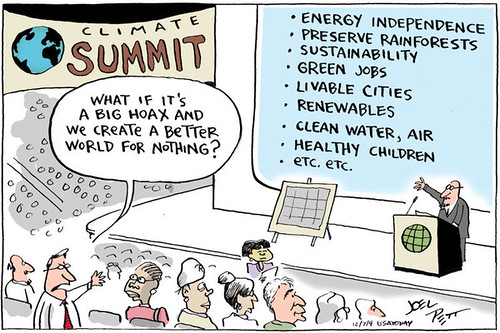
One of my goals in 2010 is to help move the sustainability debate beyond Global Warming. Global Warming or Climate Change is still arguable – while other environmental impacts and issues are not. Its surely time for sustainability advocates to reframe our narrative – and get beyond the Global Warming debate. We might as well try and convince evangelicals of evolution… instead we need to start focusing on immediate and real issues- such as a lack of potable water in many geographies. Energy independence is perhaps the best argument for renewal energy. People are generally more worried about national security than the potentials threats of global warming.
Of course some really major climate events may change the game, but for now, we should focus on the changes we can make in terms of business, culture and politics. You can understand why I love this cartoon from USA Today, which sums my thoughts up beautifully.



